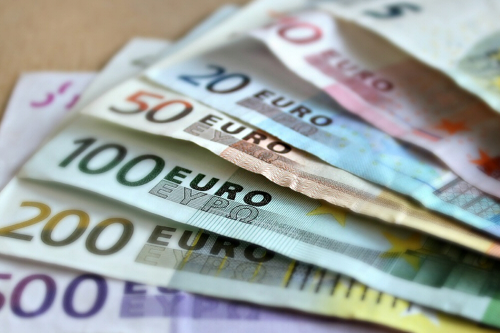Austria’s Love of Cash in Poll Campaign Spotlight
反潮流!奥地利人提议把“现金支付权”写入宪法
It may sound like a strange thing to enshrine in a country’s constitution: the right to pay cash.
现金支付权居然能在一个国家的宪法中占有一席之地,这也许听起来有点奇怪。
But a debate on whether to do just that has entered Austria’s election campaign, shining a light on the country’s love of cold, hard currency.
但是在奥地利的大选活动中掀起的一场关于是否把现金支付权写入宪法的辩论,反映出奥地利民众对冰冷的硬通货的喜爱。
The Austrian People’s Party (ÖVP) recently made the suggestion as part of its campaign for a parliamentary election in late September, for which it has a commanding poll lead.
奥地利人民党最近提出一项关于保护现金支付的议案,将其作为9月下旬议会选举的重要竞选议题,而该议题在民调中的支持率遥遥领先。
This led to other parties – though sceptical of the ÖVP’s proposal – vaunting their commitment to protecting cash, with the center-left Social Democrats (SPÖ) demanding an end to fees levied at cashpoints.
尽管其他党派对奥地利人民党的提议表示怀疑,但也彰显了自己保护现金的决心。中左翼社会民主党要求终结自动柜员机的手续费。
And it is not hard to see why all major parties see protecting cash as a vote-winner.
不难看出,所有主要党派都将保护现金视为拉票手段。
“In Austria, attitudes change slowly,” an employee of Weinschenke, a burger restaurant in downtown Vienna, told AFP.
维也纳市中心的汉堡店Weinschenke的一名员工告诉法新社说:“在奥地利,人们的心态转变得很慢。”
The woman in her 30s, who only gave her name as Victoria, says she prefers to use cash because “you don’t leave a trace”.
这位自称名叫维多利亚的30多岁女性说,她更喜欢用现金支付,因为“不会留下痕迹”。
Financial law expert Werner Doralt says Austrians put a high value on privacy and are wary of anything that could be used to keep tabs on them, such as card transactions.
金融法律专家维尔纳·多拉尔特说,奥地利人很重视隐私,警惕任何可能被用来监视自己的事物,比如银行卡交易。
“If for example I go shopping, and it’s recorded exactly how much schnapps I’ve bought, that’s an invasion of my privacy,” he says.
他说:“比如说,如果我去购物,我买了多少东西都会被精确地记录下来,这是侵犯我的隐私。”
A recent survey conducted by the ING bank in 13 European countries, Australia and the US, showed Austrians were the most resistant to the idea of giving up cash payments.
荷兰国际集团近期在13个欧洲国家、澳大利亚和美国开展的调查显示,奥地利人对于放弃现金支付的抵触情绪最大。
Just 10 percent of those surveyed in Austria said they could imagine doing without cash, compared to a European average of 22 percent.
奥地利只有10%的受访者表示,他们可以想象没有现金的生活,而欧洲国家的平均水平为22%。
According to European Central Bank data compiled in 2017, cash accounted for 67 percent of money spent at points of sale in Austria, compared to just 27 percent in the Netherlands.
根据欧洲中央银行2017年汇编的数据,奥地利各销售点的现金支付率为67%,相比之下荷兰的现金支付率只占27%。

Even in neighboring Germany, another country known for its attachment to cash, the rate is only 55 percent.
即使在邻国德国,另一个以喜爱现金支付著称的国家,现金支付率也只有55%。
Academic and author Erich Kirchler, a specialist in economic psychology, says in Austria and Germany, citizens are aware of the dangers of an overmighty state from their World War II experience.
学者、作家、经济心理学专家埃里希·基尔希勒说,奥地利和德国的公民在二战期间经历过强权国家,因此他们都意识到身处强权之下的危险。
“In that case the efficiency of state institutions becomes dangerous,” Kirchler told AFP.
基尔希勒告诉法新社说:“国家机构的高效在这种情况下变成了危险。”
It is a theory that finds a resounding echo in the slogan printed in bold on the menu of one Vienna restaurant and bar, Caffe Latte: “Cash is lived freedom!”
维也纳的一家小餐馆Caffe Latte的菜单上用粗体字印着一条标语“现金是生活的自由”,印证了这一理论。
“When we have no more cash, we become totally exposed. A totalitarian state would then have unfettered power over us,” the menu reads.
菜单上写道:“当我们不再拥有现金,我们就完全暴露了。极权国家将对我们拥有不受约束的权力。”
Admittedly the cafe accepts cards as its owner Philipp Klos says he has to think about business too.
诚然,这家小餐馆也接受银行卡支付方式,因为老板菲利普·克罗斯说,他也得为生意着想。
“In five years, there will be no more cash. I’m 100 percent sure,” he told AFP, saying the ÖVP proposal to amend the constitution is “empty talk”.
他告诉法新社说:“五年后,现金将会消失。我百分百确定。”他表示奥地利人民党修改宪法的提议是“空谈”。
Other parties and experts have also pointed out that Austria would not have the unilateral right to protect cash through constitutional changes because it uses the euro, which is under the purview of the European Central Bank.
其他党派和专家也指出,奥地利没有单方面的权利通过修改宪法来保护现金,因为奥地利使用的是欧元,而欧元属于欧洲中央银行的权力范围。
Even 17 years after the euro came into circulation, some Austrians are still finding notes and coins in their previous currency, the schilling, much of it left in forgotten hiding places in homes.
即使在欧元流通17年后,一些奥地利人仍然可以找到旧货币(先令)的钞票和硬币,其中的很大一部分都遗忘在家中的某个角落。
The haul from under the nation’s mattresses, which until now could be exchanged at the “Euro-Bus” of the Austrian National Bank (ÖNB), which toured the country, was almost 19 million schillings (1.38 million euros) this year.
奥地利的旧货币至今依然可以在奥地利国家银行的“欧元巴士”上兑换,这辆巡游全国的巴士在今年收集了近1900万先令(约合人民币1086万元)。
Unlike several other parts of the eurozone, Austrians still have an unlimited period to exchange their schillings at the ÖNB.
和欧元区的其他国家不同,奥地利人仍然可以在奥地利国家银行无限期地兑换先令。
Austrian banks, too, are behind some of their counterparts elsewhere when it comes to the ease with which clients can access debit or credit cards.
奥地利的银行在客户申办借记卡或信用卡的便捷程度上也落后于一些欧盟国家。
Following a recent EU directive, Austrian banks are phasing out “ATM cards” and renaming them debit cards.
根据欧盟最近的一项指示,奥地利的银行将逐步淘汰提款卡,并将其更名为借记卡。
And some banks are currently planning to equip the new debit cards with the ability to make payments online, as is common elsewhere.
目前奥地利的一些银行计划为新的借记卡配备网上支付功能,而这些功能在其他国家已经很常见了。
英文、中文版本下载:http://www.yingyushijie.com/shop/source/detail/id/2160.html








